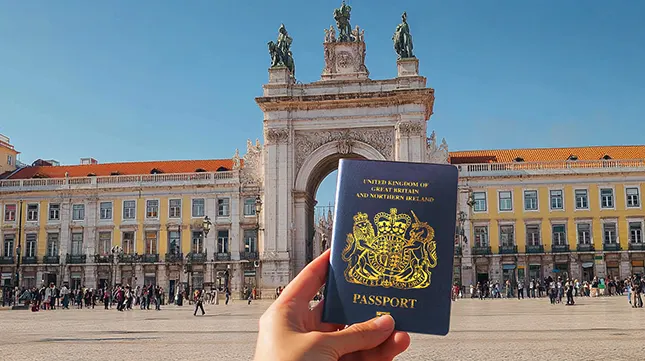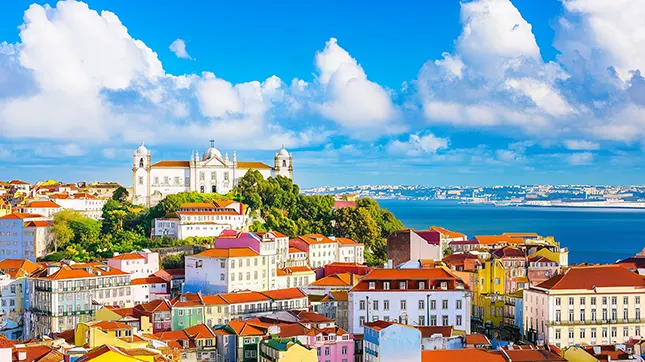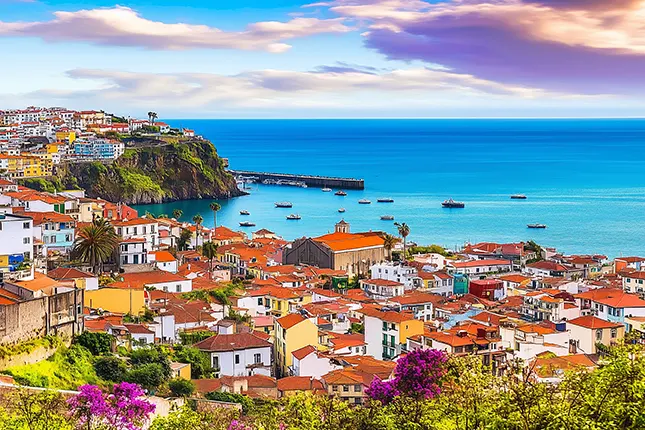Moving to Portugal from UK – 2025 Complete Guide

Imagine waking up to the gentle warmth of the sun, with the Atlantic Ocean’s waves serenading your mornings, just an everyday occurrence when you live in Portugal.
Offering an enviable lifestyle with a rich cultural tapestry and delectable cuisine to its affordable living and welcoming communities, it’s no wonder that many Brits are choosing Portugal as their new home.
Whether seeking a low-cost retirement, career progression, or an adventurous lifestyle, Portugal caters to all.
Though relocating to Europe is not quite as simple as it once was, if Portugal has been beckoning you, our extensive guide will walk you through everything you need to know.
From visas to vistas, our aim is to make your dream move to sunny Portugal a reality.
Visas and Residency for UK Expats in Portugal

Its vital you understand what visas you are eligible for.
Securing the appropriate visa is a crucial first step toward moving to Portugal.
Since the UK’s departure from the EU, UK citizens planning to move to Portugal must navigate additional immigration procedures.
D7 Visa
This visa is ideal for individuals with a stable passive income, such as pensions, rental income, or investments. Applicants must demonstrate a minimum annual income of £7,004 for the main applicant, plus 50% for a spouse and 30% for each dependent child.
Detailed information and application guidelines are available on the Portuguese government’s official visa portal:
Application Process
- Initial Application: Apply for the D7 visa at the Portuguese consulate in your country of residence. The visa is typically valid for 120 days and allows entry into Portugal for residency purposes.
- Residency Permit: Upon arrival in Portugal, schedule an appointment with the Agência para a Integração, Migrações e Asilo (AIMA) to obtain your residency permit. Appointments can be made through the official AIMA website.
- Permanent Residency: After five years of continuous legal residency, you may be eligible to apply for permanent residency, provided you meet the necessary requirements, including a basic proficiency in Portuguese.
Thorough preparation and adherence to official guidelines are imperative to facilitate a smooth transition to your new life in Portugal. Navigating the documentation takes time and patience, but don’t let that put you off!
Consult the Portuguese government’s official resources for comprehensive and up-to-date information on visa types, application procedures, and residency requirements.
Travel Requirements for UK Citizens Visiting Portugal
If you plan to visit Portugal multiple times before you finally relocate there, ensure your passport is valid for at least six months before departure, as required by the UK government.
Currently, UK citizens can stay in Portugal for up to 90 days without a visa. This gives you plenty of time to investigate locations and get a feel for what area is right for you.
Keeping up to date with any legal visa changes is important as they can happen very quickly.
There are proposed updates in the pipeline that are to come into effect at some point in 2025.
Portugal is in the process of implementing a ETIAS (European Travel Information and Authorisation System).
Put simply, it will be a new visa-waiver program that requires UK visitors to complete an online application, provide passport details, and pay a £5.80 fee per person before travel.
For the latest updates and application details, visit the European Union’s ETIAS website.
Additionally, it is advisable to check the UK Government travel page on a regular basis as regulations may change quickly.
NOTE: ETIAS is currently not in operation and will not start in the first half of 2025. No action is required from travellers at this point. The European Union will inform about the start of ETIAS several months prior to its launch.
Living in Portugal: A Year-Round Climate Overview

One of the major draws to the country is the excellent weather.
Many UK expats move abroad so that they can enjoy more sunshine hours.
Sunshine and milder winters provide a more enjoyable lifestyle, allowing for outdoor activities year-round, which is especially appealing after experiencing the UK’s grey and rainy seasons.
Portugal boasts one of Europe’s warmest climates, making it a popular destination for expats. However, temperatures vary between coastal and inland regions.
Spring brings mild, sunny days, perfect for outdoor activities.
Summers are hot, often exceeding 27°C (80°F), making beach days and poolside relaxation a must.
Autumn offers pleasant temperatures between 16-24°C (60-70°F), ideal for exploring the country.
Winters are generally mild but unpredictable, with occasional warm days balanced by heavy rainfall.
While the Algarve enjoys some of the sunniest winter days, northern regions, like Porto, experience cooler temperatures and more rain.
For real-time weather updates across Portugal, check Weather.com or the Portuguese Meteorology Institute (ipma.pt).
Learning Portuguese: A Key to Settling in
If you’re planning to move permanently to Portugal, learning Portuguese is essential, not just for daily life but also as a requirement for permanent residency.
While learning a new language varies in difficulty, Portuguese is considered relatively easy for English speakers due to shared Latin roots, making many words familiar.
Speaking the language helps with integration, making it easier to connect with locals and navigate daily tasks.
It’s best to start lessons early, and there are many ways to learn.
In the UK, language schools and colleges offer Portuguese courses.
Online platforms like Babbel and Duolingo provide interactive lessons that make learning accessible and fun.
The sooner you start, the easier your transition will be!
Where Will You Settle in Portugal?

There are some excellent places to consider moving to in Portugal.
A difficult question. If you are new to the country, there are so many stunning locations to choose from it is incredibly hard to narrow it down to one.
On the other hand, you may already have spent many holidays in Portugal and know exactly where you want to reside long term.
Here are 10 Popular expat locations in Portugal
- Lisbon – Portugal’s vibrant capital blends historic charm with modern living. It offers a thriving job market, excellent public transport, and a dynamic cultural scene, making it ideal for professionals, creatives, and digital nomads.
- Porto – A stunning riverside city known for its wine, rich history, and more affordable property prices than Lisbon. Porto offers a relaxed yet cosmopolitan lifestyle, perfect for families, retirees, and remote workers.
- The Algarve – Famous for its sunny weather, golden beaches, and relaxed pace, the Algarve is a hotspot for retirees and holiday home buyers. Towns like Lagos and Tavira provide a great mix of expat communities and local charm.
- Cascais – A picturesque coastal town near Lisbon with stunning beaches, a marina, and an upscale atmosphere. Popular with expats seeking a high-quality lifestyle, excellent international schools, and easy access to the capital.
- Sintra – Known for its fairytale-like palaces and lush greenery, Sintra offers a peaceful escape from city life. It’s cooler climate and stunning scenery attract artists, writers, and retirees looking for a slower pace of life.
- Madeira – An Atlantic island paradise with a mild climate year-round. Popular among expats seeking a lower cost of living, breathtaking landscapes, and a strong community feel, particularly in the capital, Funchal.
- Ericeira – A coastal town known for its surfing culture and stunning ocean views. With a relaxed atmosphere and growing expat presence, it’s perfect for those seeking an active outdoor lifestyle near Lisbon.
- Braga – A historic city with a youthful energy, thanks to its universities. Braga offers affordable housing, strong job prospects, and a welcoming local culture, making it great for families and professionals.
- Coimbra – A charming riverside city home to Portugal’s oldest university. It boasts a rich history, a vibrant student atmosphere, and a low cost of living, making it an attractive option for academics and retirees.
- Aveiro – Often called the “Venice of Portugal” due to its canals and colourful boats, Aveiro offers a unique lifestyle. It’s an affordable and picturesque option for those seeking a balance between city and coastal living
Portuguese Property Market Overview
Finding the right place to live is paramount. Portugal’s real estate market is diverse, offering options from city apartments to countryside villas and coastal retreats.
As of February 2025, Portugal’s property market continues its upward trajectory, solidifying its status as one of Europe’s most dynamic real estate landscapes.
This growth is particularly evident in regions like Alto Alentejo, which experienced a remarkable 26.3% surge in property values over the past year.
Traditional hotspots such as Lisbon, Porto, the Algarve, and Madeira also maintain strong demand, contributing to sustained price appreciation.
Engaging with local real estate professionals and staying informed about regional market trends is essential for effectively navigating this evolving landscape.
Rental Accommodation
You will need to secure somewhere to live quickly so that you have somewhere to go as soon as you arrive in Portugal.
Renting a home is how most UK expats start their property journey.
Finding a tenancy is a relatively straightforward process, and the rental market in Portugal has flourished over the past few years, both in the long—and short-term market.
Plus, there is a great choice of homes to suit all prospective renters, from one-bedroom homes to large sprawling villas with four or more bedrooms.
If you are on a limited budget, avoid big cities.
You will pay less in smaller towns and villages, and as a rule, the further inland you travel, the cheaper it gets.
Away from cities such as Porto and Lisbon, you can find plenty of rentals for as little as £450 per month.
If you want to experience the city vibe, you can at least double the cost.
Depending on your preferred location, many real estate agents would be happy to discuss your requirements and assist you with your rental property search.
JamesEdition has a helpful list of the top agents in the country by location, take a look for yourself and see exactly what you can rent within your budget.
Buying a Portuguese Home

The same rules apply to purchasing a home, if you want more for your money, stick to the more rural regions of the country.
Researching various locales and visiting properties in person can help you better understand what aligns with your financial plans.
For instance, while Lisbon and Porto remain pricier, regions like the Algarve and Alentejo offer more affordable alternatives.
Again, to ensure a seamless purchasing process, it is advisable to engage with local real estate agents and familiarise yourself with property laws before you start your search.
Here is a quick property purchase overview:
1. Plan Your Budget
Beyond the property price, factor in taxes, legal fees, and maintenance costs. Portugal offers options for all budgets, from luxury villas to countryside quintas. In 2025, keep an eye on IMT (property transfer tax) changes and potential costs for energy efficiency upgrades, which are increasingly required in property deals.
2. Hire a Property Lawyer
While not legally required, a Portuguese property lawyer ensures a smooth purchase by reviewing contracts and conducting due diligence. With stricter legal regulations in 2025, professional guidance is more valuable than ever to avoid costly mistakes.
3. Obtain a Portuguese Fiscal Number (NIF)
A Número de Identificação Fiscal (NIF) is essential for property transactions, opening bank accounts, and signing contracts.
This straightforward process remains unchanged for 2025 and can be done at a local tax office or via legal representatives.
4. Inspect the Property
A thorough property inspection can uncover hidden issues.
Hiring a professional surveyor is advisable, especially as more countryside homes enter the market in 2025, often requiring renovation.
Structural integrity should be a key consideration before committing.
5. Reserve Your Property
After agreeing on a price, you’ll pay a reservation fee to take the property off the market.
Due to rising demand sellers may request higher deposits, so ensure clear terms on what the fee covers before proceeding.
6. Sign the Promissory Contract
The Contrato de Promessa de Compra e Venda is a legally binding agreement outlining sale details.
A deposit is required—if the buyer withdraws, they lose it, but if the seller backs out, they must refund double. It is a significant agreement in the contract that is crucial for protecting your investment.
7. Finalise the Purchase
The final step is the Escritura (deed of sale), signed before a notary. Once the remaining balance is paid, the property is legally transferred and registered in your name.
The house-buying process remains unchanged to date. However, it is always wise to confirm details with your lawyer.
Healthcare in Portugal

Make sure you are up to speed with the healthcare system in Portugal before you move.
Understanding the healthcare system and how it works is essential when planning to spend longer periods of time in the country.
While Portugal’s public healthcare is comprehensive, many expatriates opt for private health insurance to reduce waiting times and access a broader range of services.
Researching and choosing a health insurance plan that suits your medical needs and provides peace of mind is advisable.
The system includes both public and private healthcare services, with public healthcare funded through general taxation and social security contributions.
Accessing Public Healthcare
To use Portugal’s Serviço Nacional de Saúde (SNS), you must be a legally registered resident.
Some groups, such as retirees and low-income individuals, may qualify for exemptions or subsidised care.
Public sector employees, military personnel, and police may also receive additional healthcare benefits.
Private Healthcare Options
Expats can opt for private healthcare, either as a supplement or as their primary choice.
While most public services are free, some treatments now require partial payments.
Many residents choose private insurance for faster access and broader coverage.
How to Register
To access public healthcare, you must first register with Portuguese Social Security (Segurança Social) and obtain a NIF number (financas.gov.pt).
For more details, visit the UK government’s official healthcare guide for Portugal.
Ensuring you have adequate health care coverage will give you peace of mind should the worst happen, both regarding getting the help you need and avoiding any unexpected financial burdens.
Working in Portugal

Finding employment in Portugal may be easier than you think.
Non-EU citizens must secure a work visa prior to employment.
Though Portugal is ideal for retirees, plenty of UK expats look for gainful employment in the country, and there are some shortages in certain skills currently.
Finding employment in Portugal can be streamlined by focusing on key strategies:
- Utilise Online Job Portals: The Institute of Employment and Vocational Training (IEFP) offers a comprehensive job portal with current listings and resources to assist job seekers.
- Target High-Demand Sectors: Industries such as healthcare, tourism, agriculture, and technology are experiencing labour shortages, presenting opportunities for job seekers.
- Engage Recruitment Agencies and Network: Collaborating with recruitment agencies and attending local networking events or job fairs can connect you with potential employers.
- Explore Remote Work Options: The rise of remote work has expanded opportunities across various sectors, allowing for greater flexibility in job location.
- Stay Informed on Labor Market Trends: With an unemployment rate of around 6%, sectors like tourism and renewable energy are growing, though long-term unemployment remains higher among older workers, emphasising the need for continuous skill development.
While proficiency in Portuguese enhances employment prospects, especially in customer-facing roles, many positions in IT, tourism, and hospitality value English-speaking candidates.
Finding a job in Portugal will take time and effort, but the benefits far outweigh the time and patience required.
Studying in Portugal

There are plenty of good options when it comes to schools.
Studying in another country is a priceless experience, and you could join the almost 75,000 international students already enjoying the experience.
Portugal is home to esteemed educational institutions, such as the University of Lisbon and the University of Porto.
Researching courses and understanding admission requirements can pave the way for a fulfilling academic experience.
Here’s a simplified version of how to apply to study in Portugal:
1. Choose Your Program & University
- Research Portuguese universities and programs.
- Check if the course is taught in English or Portuguese.
2. Apply to Your Chosen Institution
- Undergraduate: Apply through the Candidatura Online portal.
- Postgraduate: Apply directly to the university.
- Prepare required documents (passport, transcripts, language proof, motivation letter, etc.).
3. Be Aware of Deadlines
- Applications typically open in January and close by July, varying by university.
4. Get a Student Visa (For Non-EU Students)
- Obtain an acceptance letter from your university.
- Apply for a student visa at the Portuguese consulate.
- On arrival, apply for a residence permit within 90 days.
5. Plan Your Arrival
- Arrange accommodation (student housing or private rental).
- Budget for tuition fees and living expenses.
- Attend orientation sessions to settle in.
By following these steps, you will navigate the system easily and soon join the thousands of foreign students reaping the benefits of studying in Portugal.
Taxes in Portugal for UK Nationals
The UK and Portugal have a double tax agreement, ensuring you won’t be taxed on the same income in both countries.
If you become a registered resident in Portugal, you must declare your global income to Portuguese tax authorities, regardless of where it originates.
Non-residents only pay tax on income earned in Portugal, typically at a 28% flat rate (2024-2025).
If you need to pay taxes in Portugal, you must obtain a Número de Identificação Fiscal (NIF).
This tax number is also required for buying property, opening a bank account, or signing a long-term rental.
UK nationals may benefit from the Non-Habitual Residents (NHR) tax scheme, which offers tax breaks to foreign residents. Learn more about tax obligations in Portugal on the Boundless website.
Consulting with a tax advisor can provide personalised insights and ensure compliance with both UK and Portuguese tax obligations.
Opening a Bank Account in Portugal

Make sure you open a Portuguese bank account when making the move.
For longer-term stays in the country, you will need to have access to a Portuguese bank account. However, not all banks cater to foreigners, so it’s important to research your options first.
Opening a Portuguese bank account simplifies transactions, from paying bills to receiving salaries.
Most major Portuguese banks offer online and mobile banking, which can sometimes be set up remotely, though some require an in-person visit with valid ID.
To open an account, you will also need your Portuguese tax number (NIF—Número de Identificação Fiscal).
ATMs are widely available in cities and large towns but may be limited in rural areas.
Major Portuguese banks include Banco de Investimento Global, Banco Montepio, and Millennium BCP.
International banks such as Barclays and Santander also operate in Portugal, making them a popular choice for expats.
Getting the Best Exchange Rate When Moving to Portugal
When relocating to Portugal from the UK or any country with a different currency, securing the best exchange rate is crucial.
It can significantly impact your finances, especially when buying property, covering living expenses, or making large transfers.
Exchange rates fluctuate, and using a specialist foreign exchange (FX) service often provides better value than traditional high-street banks.
Competitive rates can mean the difference between affording your dream home or falling short.
White & Company has an exclusive partnership with Currencies Direct, offering preferential exchange rates and potential savings on international money transfers.
To explore your options and see how much you could save, follow this link: Currencies Direct.
Portuguese Customs Regulations
If you intend to move all your personal effects to Portugal, you must familiarise yourself with the import customs regulations.
You can import used household goods duty-free, provided they have been in your possession for at least six months and are intended for personal use.
To qualify for exemption, you’ll need:
- A detailed inventory list (in Portuguese) with values.
- Proof of residence in Portugal (rental contract or utility bill).
- A passport and Portuguese tax number (NIF).
- A certificate of change of residence if moving from outside the EU.
Customs may inspect shipments, and restricted items (e.g., alcohol, tobacco, or new items) could incur duties.
If arriving from a non-EU country, goods must be imported within 12 months of residency approval.
For full details, check Portuguese Customs.
Moving your Belongings to Portugal

Moving your Belongings to Portugal is easy with White & Company.
At some point in your relocation journey, you will need to arrange the transportation of your household effects from your UK home to your new home in Portugal.
It is possible to relocate your personal belongings to Portugal yourself rather than using a professional removal company, but the process can be complex, especially when dealing with customs clearance.
For non-EU relocations, customs clearance for self-packed consignments attracts particular scrutiny by customs officials, which is time-consuming and requires additional paperwork.
If you go it alone, you must find a removal company yourself and the whole process is further exacerbated if you can’t speak Portuguese.
Shipping times vary depending on the port of entry, but it will be several weeks before your consignment arrives, clears the port and is finally delivered.
If you’re unfamiliar with the process, hiring a professional will not just save time and stress but money.
When you use a professional European removal company such as White & Company, your belongings will be quickly customs cleared, and all the necessary paperwork will already be in place.
Our long-term trusted partners in Portugal will collect your effects and then contact you to arrange a suitable delivery date.
Moving to Portugal from UK With White & Company

With countless removal companies to choose from, selecting one with a proven track record is essential. With over 150 years of experience, White & Company has been expertly shipping personal effects worldwide for decades.
Our in-depth knowledge of international export and import regulations ensures a smooth transition, even when navigating complex customs requirements.
We take care of every detail, allowing you to focus on the other important aspects of moving abroad.
For added peace of mind, we are proud members of FIDI, OMNI, and BAR, adhering to strict industry standards. This guarantees a reliable, professional service, ensuring your belongings are safely transported from door to door.

Max is a seasoned writer and blogger in the real estate and home moving sectors, as well as a knowledgeable source of information for expatriates living and working abroad. His detailed insights have helped thousands of people move and live abroad with greater simplicity and ease.
Posted in: News
Leave a Comment (0) ↓




